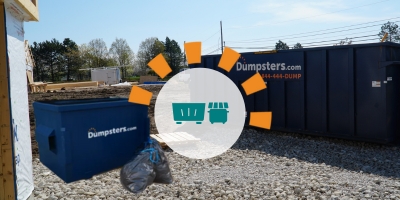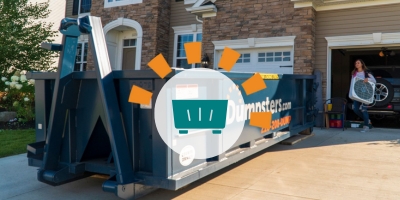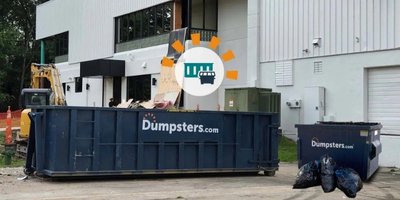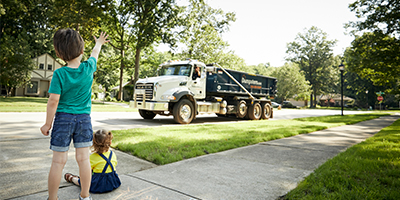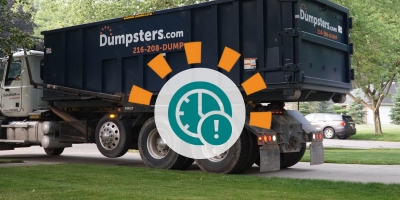Dump Trailer vs. Dumpster: What's Better for Your Business?
Learn which to use — and why — with our handy guide to dumpsters vs. dump trailers.
Make cleanup a breeze with a roll off dumpster:
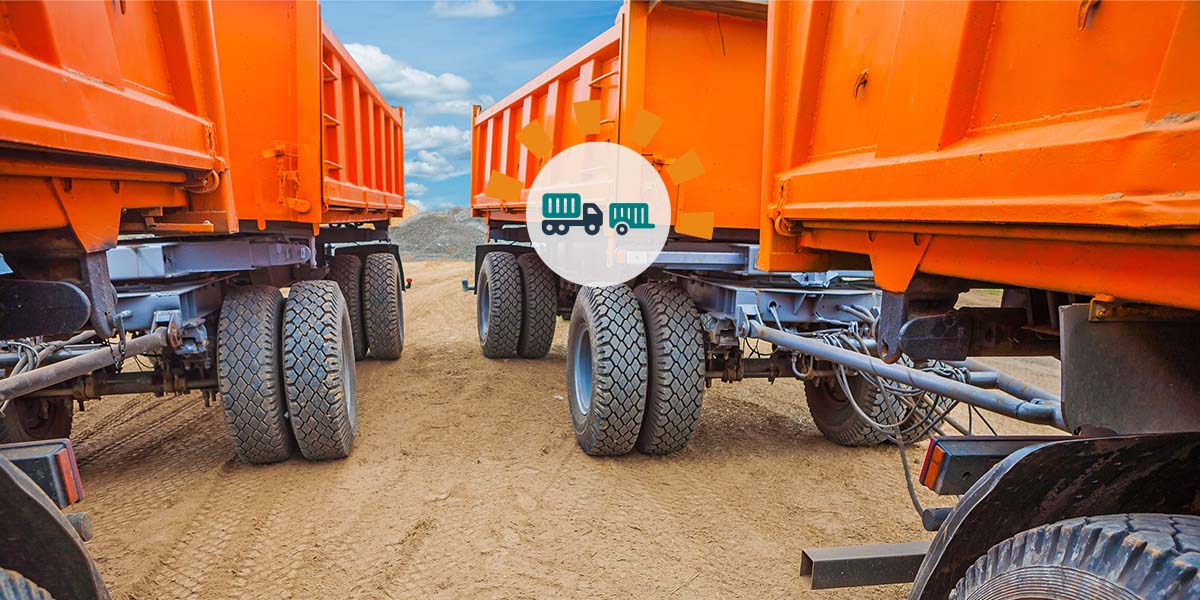
The Dumpster vs. Dump Trailer Debate
It’s a thought any business owner has had to answer: What changes can I make to improve my bottom line?
In the construction and roofing industries, waste removal often significantly impacts your bottom line. While there are plenty of disposal options, roll off dumpsters and dump trailers are popular choices. But which is better? Well, it depends on the project and your business needs. Let’s dig deeper.
What Is a Dump Trailer?
Dump trailers are containers with wheels and high sides used to haul waste to a dump. Because of their mobility, trailers are also known as rubber-wheeled dumpsters. But they are not the same as a roll off dumpster, mostly due to hauling differences and how much waste they can carry.
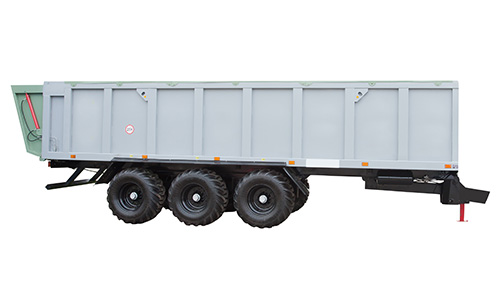
Types of Dump Trailers
From frames to gates and everything between, there are plenty of variations. The three most common frame types for dump trailers are: channel, I-beam and tubular. Each has pros and cons, but ultimately it comes down to cost and strength.
- Channel frame: Typically, the least expensive and weakest frame type, but often seen in smaller dump trailers. Channel frames feature a rectangular shape with a side missing. This allows the supports to slide inside the frame to be connected by bolts.
- I-beam frame: Usually considered a “middle-ground” frame, featured on longer trailers. It's a mid-expense, mid-strength frame that features two, sometimes three, I-beams that run lengthwise near the wheels of the trailer.
- Tubular frame: Considered the strongest, but most expensive, frame style. Tubular frames are virtually the same as channel in terms of appearance, except they are entirely closed. They're often used in small to medium-length dump trailers.
Other Dump Trailer Features
Features | Most Common Types | ||
|---|---|---|---|
Lifting Mechanism | Telescopic hydraulic, dual-piston or scissor lift. | ||
Dumping Style | Side, rear or bottom. | ||
Size | Range from 8-20 feet in length; 12-14 feet is most common. | ||
Wheel Placement | Either built into the trailer frame or set below. | ||
Axles | One, two or three. | ||
Gates (optional) | Single door, barn door, truck bed, spreader, mesh, built-in ramps. |
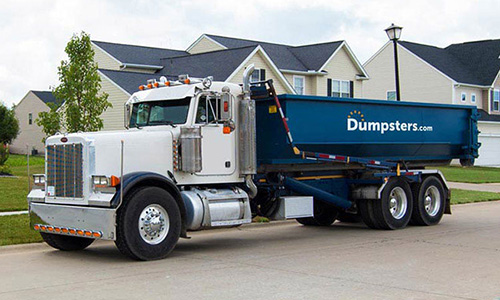
Dumpster Rental Options
Renting a dumpster is more straightforward than a dump trailer. There are just a few factors you need to consider:
- Size: Most companies offer 10 to 40 cubic yard dumpsters.
- Weight: Each dumpster comes with a generous weight limit.
- Special Use: While most dumpsters handle junk removal and construction debris, there are some specially made to handle certain materials, such as roofing debris, yard waste and dirt.
Order a Dumpster Online
Shopping after hours? Too busy to make another call? Book the dumpster you need, when you need it. Order your dumpster online 24/7.
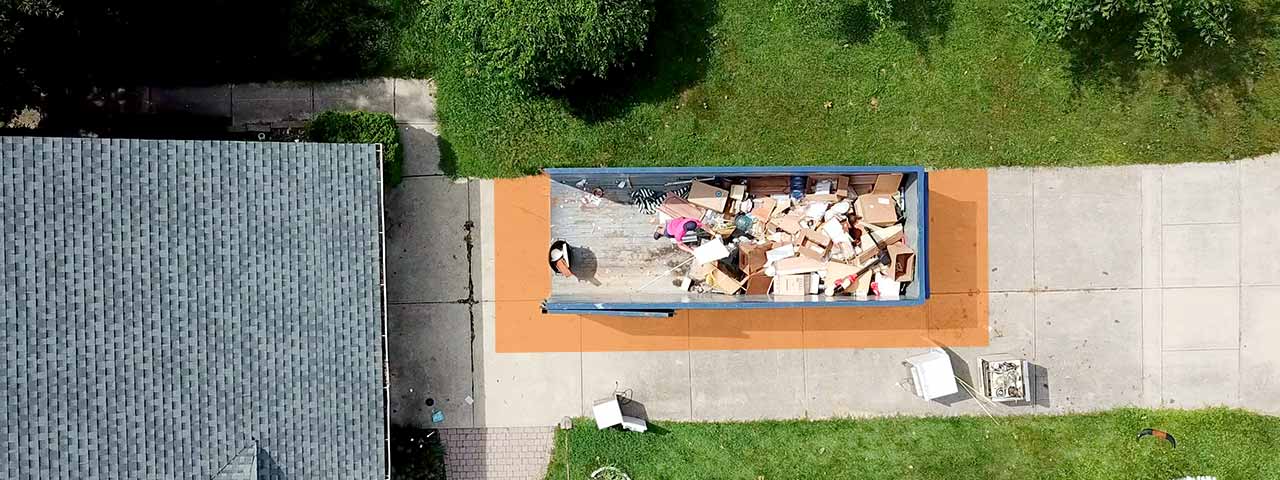
Dumpster Rental vs. Dump Trailer
Now that you’re familiar with the basics of dumpsters and dump trailers, it’s time to see how they stack up. Let’s compare the two options on three fronts: price, convenience and hauling capacity.
1. Price Comparison
The average price to rent a dump trailer ranges from $60-$150 per day, while the average cost to buy a dump trailer can range from $3,000-$15,000 depending on the size and type.
A typical dumpster rental ranges from 7-10 days, with the 20 yard bin being the most popular. The average price of a 20 yard roll off dumpster ranges from $268-$657.
To rent a dump trailer for the same amount of time, you’d pay $600-$1,500.
Extra Costs of Dumpsters and Dump Trailers
Dumpsters | Dump Trailers | ||
|---|---|---|---|
|
|

"After you factor in time spent driving, gas, retail rates at the landfill and labor costs practically doubling because they have to load and then unload the truck or trailer, most times a dumpster is a more economical option."
2. The Convenience Factor
A tool is only as effective as the effort you’re willing to put in to make it work. The same applies for dumpsters and dump trailers.
Each option comes with its advantages and disadvantages, from time saved to mobility.
The Pros and Cons Breakdown
Pros | Cons | |
|---|---|---|
Dumpsters |
|
|
Dump Trailers |
|
|
Generally speaking, a dumpster is the more convenient option. There is less that you have to take care of with a roll off rental, while you’re responsible for everything with a dump trailer. Nevertheless, when you own a trailer you have complete control over placement and timing, which isn’t the case with a roll off.
White noted that for smaller projects at a residential address, a dump trailer will more often be a better option. However, he added that the ease of use with a dumpster can’t be ignored, even for smaller projects.
In the end, it comes down to your business needs. If you want more convenient waste disposal, a dumpster rental is probably the route to go. If you don’t mind a bit more work, a trailer is a fine option.
3. Hauling Comparison
The best way to determine the hauling capacity is by the weight limit. Still, keep in mind that even if a dump trailer can haul as much as a container based on weight limits, the lower side walls of a dump trailer may limit the amount of debris you can toss.
The chart below gives a few common household projects and the number of dumpsters or dump trailers needed to get rid of the debris.
Project | Dumpsters | Dump Trailers* |
|---|---|---|
Completing a roof tear-off | One 20 yard dumpster | One or more dump trailer |
Cleaning out a home | One 30 yard dumpster | Two dump trailers |
Tearing down a garage | One 40 yard dumpster | Two or more dump trailers |
It Depends on the Debris
Every project is different. While some might work with a dump trailer, others might benefit from a roll off dumpster rental. Whichever option you choose, the key is making sure that your decision is in the best interest of your business.
Is a roll off dumpster what you need? Browse our available sizes to rent a container in your area.
What Do You Think?
Did you use a dumpster or dump trailer for your project? Tell us about it. Head over to Twitter, Facebook or LinkedIn, and use #dumpstersblog to join the conversation.

